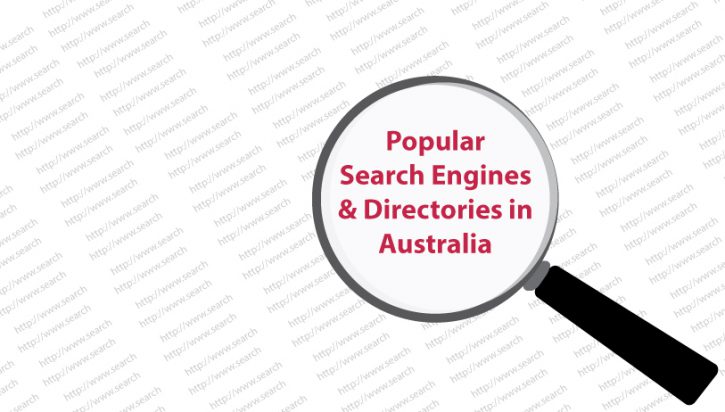
What Are Australia’s Major Search Engines and Directories?
Search engines are obviously the most popular means of finding information, and while the market is dominated by Google, there are other players in the industry. Search engines rank websites according to different algorithms and have different features that separate them from one another. They can, therefore, be utilised in different ways to promote your business.
Directories, which essentially categorise and link to different kinds of websites, are also very important as far as helping a business generate an online presence.
Related article: 13 Basic SEO Tips for Business Owners to Get Started
This article will provide readers with information on Australia’s leading search engines and directories.
Top 5 Search Engines Used by Australians
1. Google
Website: https://www.google.com.au/
As expected, Google ranks as the number one search engine by a significant margin and ultimately dominates the search industry. It currently holds more than 94.68% market share in Australia. Like Facebook, the company originally started as a University Project before growing into one of the most recognisable global brand names (Google is now even considered a verb by most modern dictionaries).
Before Google, early search engines such as AltaVista and others essentially ranked pages according to the number of times a keyword appeared on a particular page. PhD students Larry Page and Sergey Brin of Stanford University theorised that it would be more helpful for users if pages were ranked according to the authority of the webpage.
Early search engines could easily be duped into highly-ranking websites whose content was keyword-stuffed and not all that valuable to the user at all.
Google’s PageRank technology introduced the idea that the quality or relevance of a website could be determined by the number of pages that link to it and the importance of those pages. Backlinks still play a fundamental part in the Google search algorithm, which is periodically being adjusted to improve the user experience.
Since its conception in 1997, Google has launched a number of other products closely associated with search. Among these are Google Ads, Google Analytics, Google Search Console, Google My Business etc.
2. Bing
Website: https://www.bing.com/?cc=au
Microsoft’s search engine Bing was officially launched in 2009, though it previously existed under other names such as MSN Search and Live Search. Since branding itself under the new name, the search engine has continued to see its market share grow, but it’s still far behind Google. At the start of 2019, Bing has slightly more than 3.5% market share in Australia, with an additional 0.72% search volume from MSN Australia.
Bing also powers Yahoo Search. Though Yahoo isn’t much popular in Australia as a search engine (only 0.52% market share), this alliance has helped Bing grow significantly in other countries, especially in the US. On the other hand, Bing has been replaced by Google as Apple’s default search engine, which is a big setback for them.
3. DuckDuckGo
Website: https://duckduckgo.com/
Launched ten years ago, DuckDuckGo is relatively new among the top search engines. It currently has a 0.59% market share in Australia, putting it ahead of Yahoo (0.52%) and Baidu (0.08%).
DuckDuckGo is popular among privacy-concerned users because it doesn’t log user data or track user activity. It’s quite good for regular searches but still falls short of challenging the popularity of Google or Bing.
4. Yahoo
Website: https://au.yahoo.com/
Founded in 1994, Yahoo was previously considered a leader in terms of market share in web search. While it’s still the 4th most used search engine in Australia, its relevance has been dwindling away, and it has lost a lot of ground to Google. Yahoo’s search has been mostly powered by Bing since 2009. Currently, it has a 0.91% market share in Australia.
Originally, Yahoo did not crawl or index web pages but would rather send queries through Inktomi and Google. It presented the search results with Yahoo branding but actually relied on other providers. Yahoo created its own original web-crawler technology in 2004, combining the capability of multiple search engines they had previously acquired. Until March 2018, Seven West Media-owned 50% of Yahoo Australia (also known as Yahoo7).
5. Ecosia
Website: https://www.ecosia.org/?c=en
Ecosia was founded in 2009. It is also known as the tree planting search engine as the goal is to help in financing planting trees and restoration projects. In terms of search engine market share in Australia, Ecosia’s share is around 0.1%. With 70+ active projects, there are around 20 million people using Ecosia.
Just like other search engines, Ecosia generates revenue from the clicks on advertisements that appear beside and above the search results. But what makes it different is that it used 80% of its revenue to plant trees. So, with each click, users get the chance to plant a tree.
Top 15 Australian Directories
There is some debate in regard to the effectiveness of utilising directories as a means of improving ranks for a website, but there is no question that they still form an important part of any online marketing strategy.
Over the years, search engine algorithms have increasingly placed less emphasis on low-quality backlinks, which may describe listings in many directories. Further, the extent to which they are used has decreased somewhat, as search engines have become much more user-friendly and deliver better results.
The average consumer is arguably more likely to search for a service in Google rather than a directory. This is relevant because the less traffic a directory receives, the less relevant it is from an SEO perspective. However, there are certain niche directories that can be very valuable to users who, for instance, aren’t entirely sure of what they need to type into a search engine to get the desired result.
Yelp Australia is one of the biggest directories in the country, with more than 1.5 million visitors per month. Part of Yelp’s popularity is its review feature, which can be very helpful to potential consumers. With the Australian version launched in 2011, it can be used to search for information about everything from restaurants and nightclubs to doctors.
2. TrueLocal
Having similar features to Yelp, TrueLocal is used by many Australians and receives 1.1 million searches on a monthly basis. It enables users to search for businesses in their area and boasts that it is ‘Australia’s largest collection of trusted local businesses’. Owned by Sensis, businesses can also advertise on the website for more exposure.
3. Yellow Pages
Despite the fact that usage figures for both their print and web media have been falling away, Yellow Pages still get more than 9 million searches each month. Businesses are able to submit information on the website for free and users can see reviews given by others.
4. StartLocal
Launched in 2006, StartLocal receives more than a million monthly visits by Australians looking for trusted local businesses.
5. White Pages
White Pages is one of the most trusted business directories in Australia, listing not only businesses but also people and different government organisations.
6. Hotfrog
Headquartered in Sydney, Hot Frog operates in 32 countries worldwide. It’s one of the high-quality free business listing sites in Australia. Hotfrog Australia receives more than 2.7 million visits per month.
7. AussieWeb
AussieWeb is a popular local business directory. It’s simple to list your business here for free. They verify each listing request before adding. You can add up to nine images and embed videos too.
8. Womo
Womo or Word of Mouth claims to be the number one business review site in Australia. They have a clean design and a useful review system that makes it easy to mark spam.
9. Search Frog
Search Frog is a quality business directory that has several unique features. First of all, they have an onsite blog to attract early buyers which is not common for business listing sites. They provide call and referral tracking, Google review integration, and manual listing verification to provide the best user experience.
10. Local.com.au
Local.com.au has been an active business listing for about two decades. They are one of the first online-focused business directories in Australia.
Google business profile, formerly called Google My Business is an easy-to-use tool for businesses and organisations to manage the online presence across Google products like Maps and Search.
12. Bing Places
Bing Places for Business is a free local listing service allowing local business owners to add their listings to Bing Maps. It allows the managing of online listing alongside customer reviews and comments to enhance local SEO.
13. Cylex
Cylex local search is an online business directory in the form of a community portal that delivers relevant search results to users. It operates over 35 online business directories, visited by more than 1 million users daily. Companies can display everything on their profile page that potential customers might be looking for like Google Maps, pricing lists, menus, products catalogue, brochures etc.
14. Foursquare
With over 2 million businesses taking advantage of Foursquare to join the conversation and grow their business, Foursquare is a leading cloud-based location technology platform. It is an independent platform with high domain authority.
15. Flying solo
Flying Solo is one of Australia’s communities for micro-business owners. It is used to find businesses that complement one another.
Though global search engines dominate the web in Australia, the local business directories are quite popular, as expected. If you want to promote your business online, it’s best to take help from an expert SEO agency. WebAlive has been providing SEO services to Australian businesses since 2003. Contact us today to get a free consultation.
You read a lot. We like that
Want to take your online business to the next level? Get the tips and insights that matter.

